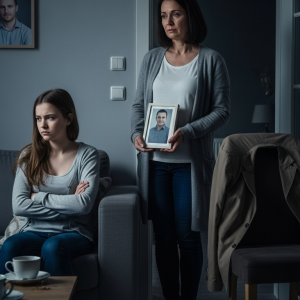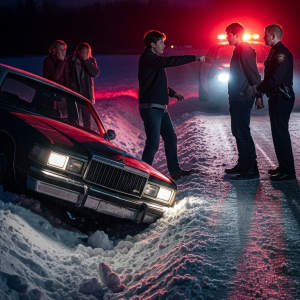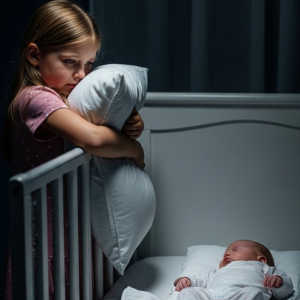This is a story from 22 years ago, a ghost that I thought was long buried. I’m 41 now, but this chapter of my life began just days after my 19th birthday.
I grew up in Adelaide, one of four kids—an older brother and two younger sisters. We were a tight-knit family, or so I believed. We had close family friends, the kind of people you call “aunt” and “uncle” even if you share no blood. Their daughter was like another sister to us. During the party for my 19th birthday, she made a serious accusation against me. She claimed I had assaulted her.
My world imploded. Without a moment’s hesitation, without a single question directed at me, my family took her side. The verdict was instantaneous and brutal. I was disowned, cast out of the house I grew up in with nothing but the clothes on my back. That night, I became a ghost to them.
My salvation came in the form of my aunt, my father’s sister, who lived in Melbourne—an eight-hour bus ride away. She and her family took me in without question. They became my rock. They believed in me when my own parents and siblings had thrown me away. With their support, I rebuilt my life from the ground up. I finished university, met the woman who would become my wife, and started a family of my own. We have two beautiful children, a boy and a girl, now ten and seven. My aunt and uncle are their true grandparents; my cousins are their uncles. We have dinner at their house every week. They are my family.
Then, about three weeks ago, the past came knocking. My aunt called, her voice strained. “Your father and siblings are here,” she said. “They want to speak with you.”
A cold dread settled in my stomach. I had no desire to see them, but my aunt gently insisted. “Just hear what they have to say,” she urged. “For your own peace of mind, if nothing else.”
Reluctantly, I drove to her house. And there they were. Sitting in my aunt’s familiar living room, looking like faded photographs from a life I no longer lived. They were so much older, etched with lines of time and worry, but it was them. The strangers who shared my DNA.
I didn’t waste time with pleasantries. “What do you want?” I asked, my voice flat, devoid of the emotion I thought I would feel.
My father, his hands trembling slightly, began to speak. My siblings chimed in, their voices thick with unshed tears. They explained that they had recently spoken with my accuser. After 22 years, she had finally confessed. It was all a lie.
They started weeping then, a torrent of apologies and regret. They begged for my forgiveness, their words tumbling over each other in a desperate plea to reconnect, to stitch back together the family they had torn apart.
I listened in silence. When they finished, their tear-streaked faces looking at me with pathetic hope, I simply said, “No.”
I stood up to leave. My older brother shot out of his chair and grabbed my arm. “Please,” he begged, his voice cracking. “Don’t do this. We can work this out. We’re family.”
That word—family—was the spark that ignited the cold void inside me. I turned to face them, my gaze sweeping over each of their faces.
“No, you’re not,” I said, my voice dangerously calm. “You are strangers to me. My real family is here, in this house. My aunt, my uncle… their sons were the best men at my wedding. They are my brothers. I even took my aunt’s surname years ago.”
The sound that escaped my father’s lips was a raw, guttural sob. He crumpled in on himself, completely broken. I watched him, expecting to feel anger, or satisfaction, or something. But there was nothing. Just emptiness. These people were ghosts, and I felt no connection to them. I didn’t even care enough to ask why the truth had finally come out. It didn’t matter anymore.
“You’re dead to me,” I told them, the words falling like stones in the quiet room. “Just as I was dead to you for 22 years. Never contact me again.”
I turned and walked out, leaving the sound of their collective weeping behind me. I didn’t look back. My aunt has called a few times since, gently suggesting forgiveness. But I told her there is nothing to forgive. You can’t forgive strangers for things they did in a past life. She understands and respects my decision. I don’t need revenge or legal action. I don’t need their apologies. They don’t have my number, and I don’t have social media. For me, they simply don’t exist. I have my own family now, a family built on trust and love, not on betrayal. And that is all that matters.
I need to be honest; I know I’m the one who shattered the relationship with my only daughter. But it’s been three long years. I miss her terribly, and I don’t understand why she can’t find it in her heart to move on.
Three years ago, I married my current wife. She’s 21 now. When we got married, it sent shockwaves through my life. Friends, family, my ex-wife, and especially my daughter—they were all horrified. But I had to marry her. She is beautiful, intelligent, and kind. She is the only one for me.
My daughter, who was the same age as my new wife, didn’t take it well. She begged me to end the marriage. She pleaded with my wife to leave me. The arguments were constant, brutal. In one heated, terrible moment, I said things I can never take back. I told her I wished she had never been born. That I resented her. That she meant nothing to me compared to my wife.
Our already rocky relationship crumbled to dust. She cut off all contact. For three years, there was silence. I told myself I was fine, that my new life was enough. But a deep loneliness began to fester. A few weeks ago, driven by a hollow ache in my chest, I looked her up on social media.
And there it was: a picture of her, smiling, with a ring on her finger. She was engaged. I’m her father, and I found out about my own daughter’s engagement through a screen. That’s when the weight of my mistake finally crushed me. I don’t want to miss any more of her life.
I tried to message her, but she had blocked me. Desperate, I reached out to my parents, her grandparents, and asked them to intervene.
A few days later, a message appeared. She had unblocked me. “Grandma and Grandpa won’t leave me alone,” it read. “Fine. The park. Saturday at 2 PM. Don’t be late.”
Hope, fragile but fierce, surged through me. This was it. My chance to make things right.
But on Saturday, I made a catastrophic mistake. My wife… she was just being so playful, so full of life. She’s “too cute to ignore,” as I always say. One thing led to another, and we lost track of time, wrapped up in each other. When I finally glanced at the clock, my heart stopped. It was 2:30 PM.
I raced to the park, my mind scrambling for an excuse. I found her sitting on a bench, not looking angry or impatient, but worse—she looked resigned, as if she had expected this all along. Her expression was a mask of cold indifference.
“I’m so sorry, I just… lost track of time,” I stammered, the words sounding pathetic even to my own ears.
She didn’t even look at me. “I know,” she said, her voice completely flat. “You always do.”
I tried to apologize again, to explain, but she cut me off. “Tell your parents to leave me alone,” she said, her eyes finally meeting mine, and they were like chips of ice. “This was a mistake. You are not my father anymore. And just so we’re clear, you are not invited to my wedding. My uncle will be walking me down the aisle.”
Just then, a young man walked up and put his hand on her shoulder. Her fiancé. She didn’t introduce us. She simply stood up, took his hand, and they walked away, leaving me standing there, a broken man on a park bench.
My phone has been buzzing nonstop with angry calls from my parents, blaming me for embarrassing them and ruining the one chance I had. But as I sit here now, with my wife by my side, I try to tell myself she’s all I need. But the silence from my daughter is deafening, and I feel so utterly, completely alone.
My wife was always the heart of our home’s kitchen. As an Italian, her cooking was one of the first things I fell in love with. I always made a point to thank her for every meal, and I taught our two children—a son and a daughter—to do the same.
For the past year, my son has become fascinated with cooking, inspired by videos online. My wife was thrilled to teach him, and they started spending a couple of nights a week together, shopping for ingredients and creating new dishes. It was a wonderful way for them to bond.
About a month ago, my son, brimming with newfound confidence, asked if he could cook a meal for the family all by himself. I thought it was a great idea. My wife hesitated, a flicker of something I couldn’t read in her eyes, before agreeing.
That Saturday, he got to work. My wife tried to supervise, but he proudly insisted he could handle it. She retreated to the living room, looking strangely dejected. “Don’t worry,” I whispered to her. “He’s just excited to try it alone. He still loves cooking with you.” She managed a weak smile, but she still seemed off.
When we sat down to eat, I was genuinely blown away. The food was incredible. Wanting to encourage his passion, I showered him with praise, pointing out what he did well and gently suggesting minor improvements. I was more effusive than I usually was with my wife’s cooking, and in hindsight, I see that was my fatal error.
Our daughter, in typical little-sister fashion, rudely insulted his cooking. I was about to correct her when my wife made a sharp sound. She pushed her plate away with a loud clatter.
“She’s right,” my wife declared, her voice cold. “It’s too salty. And the chicken is overcooked.”
The light in my son’s eyes died. I watched his face fall, his pride turning to shame in an instant. The rest of the meal was eaten in a tense silence. Later, I found him in his room, trying to hide that he’d been crying.
Once the kids were asleep, I confronted my wife. She tried to brush it off, but I pushed. Suddenly, she exploded. “You complimented his cooking more in five minutes than you have mine in a year!” she yelled.
I was so stunned by the sheer jealousy she was showing towards our own son that I let out an involuntary scoff. That was like throwing gasoline on a fire. We argued, and eventually, she conceded she had been too harsh and promised to apologize.
But she didn’t. The next morning, I was driving my son to school when I noticed he was trying to hide his face. When I asked what was wrong, he broke down. He told me that after I’d gone to bed, his mother had informed him that “she would be cooking alone from now on.”
I was furious. That night, it escalated into a full-blown shouting match. I called her childish and vindictive. She called him a baby and said cooking wasn’t a man’s job anyway. The next day, she began a campaign of cruel favoritism, showering our daughter with gifts and attention while almost completely ignoring our son.
It was emotional abuse, plain and simple. I told her I would not let her use our family’s money to punish our son. The fighting was constant. I moved into the guest room. After a month of this poison spreading through our home, I knew I had to act. I consulted a lawyer and took my son to my parents’ house to explain the situation. Seeing their grandson’s pain, they finally understood the severity of it.
That weekend, I told my wife she had to leave the house until she sorted herself out. I offered to pay for a motel and mandatory weekly therapy. To my surprise, she agreed.
For the first month, things seemed to be improving. She attended her sessions and was treating our son well during our family dinners. I was hopeful. Then, one Friday, my phone exploded with a wall of angry texts. She accused me of trying to steal her children, of cheating on her. She had vanished from my parents’ house, taking all her things.
It turned out her “best friend” had convinced her I was the villain. She moved in with this friend and went on a week-long bender of clubbing, drinking, and experimenting with substances. A week later, I got a text from the friend, mocking me, telling me my wife was with a younger man.
The call I had been dreading came from a hospital at 3 AM. My wife had overdosed. Someone had dropped her at the ER and fled.
I rushed to her side. When she was finally lucid, she sobbed and apologized, admitting to parts of her reckless week. I asked her if she had been with someone else. Her silence was the only answer I needed.
The next day, I drove her back to my parents’ house. I helped her into bed. Before I left, I placed the divorce papers on the table beside her.
“I expect you to sign these within a week,” I said, my voice devoid of all emotion. “I have proof of the adultery. I’m filing for full custody.”
Since then, my life has been a storm of calls and texts—from her, begging one minute and screaming the next, and from her family, threatening me. My parents think my timing was harsh, but I am resolute. The woman I married is gone, replaced by someone willing to destroy her own child’s spirit out of jealousy. I will not let that poison touch my children ever again. I’m taking them to therapy next week to help them understand. Our new life, a quieter and safer one, begins now.




